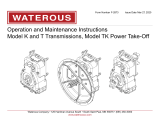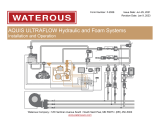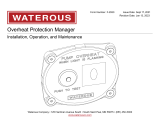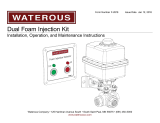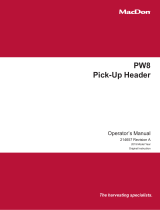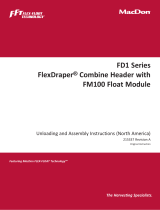Page is loading ...


Table of Contents
Safety 4
Safety Precautions 4
Introduction 5
Using this Document 5
Viewing the Document Electronically 5
Printing the Document 5
Product Overview 6
Air Inlet-Trim Valve 6
Fixed/Manual Pressure Regulator 6
Balance Valve 7
Calibration 8
Preparing for Calibration 8
Modifying the Equipment 8
Calibrating the System—Unload Mode 9
Calibrating the System—Fixed Mode 10
Calibrating the System—Auto Mode 11

4 | 13
Safety Introduction CalibrationProduct Overview
Safety Precautions
• Read and understand all the associated documentation before you begin the
calibration procedure.
• Read and understand all the notices and safety precautions.
• Be aware that these instructions are only guidelines and are not meant to be
definitive. Contact Waterous when you have questions about the calibration
procedure.
• Do not perform the calibration if you are not familiar with the tools and skills
needed to safely perform the procedure.
• Do not operate the equipment when safety guards are removed.
• Do not modify the equipment.
NOTICE
Modifying the equipment
can damage components
and void your warranty.
•
Do not modify the system
or any of its components.
•
Modification
Do not enter reach into or
enter the compartment
when the equipment is on.
Rotating parts can cause
severe injury or death
Moving Parts
•
•
Components reach high
temperatures during
operation--wear protective
equipment when making
adjustments.
Hot surface can burn you.
Hot Surface
•
•

5 | 13
Safety Introduction CalibrationProduct Overview
Use this document to calibrate your Waterous equipment. Understand the
following conditions before continuing with the document:
• The illustrations in this document are intended to convey concepts. Do not
use the illustrations to determine physical attributes, placement, or
proportion.
• Understand that your application may require additional steps, that are not
described in the illustrations or instructions, to perform the calibration.
• The procedures described in this document are intended to be performed by
a person or persons with the necessary skills and knowledge to perform
similar procedures. Contact Waterous for more information.
• The information in this document is subject to change without notice.
This document is divided into the following sections:
Safety
This section describes general precautions and alert symbols that are in this
document.
Introduction
This section is an overview of the document.
Product Overview
This section describes the parts used to calibrate the system.
Calibration
This section describes the calibration procedures.
Using this Document
Use the guidelines below when viewing this document.
Viewing the Document Electronically
• View this document in landscape orientation.
• Use the table of contents to navigate directly to that section.
Printing the Document
• The document is viewed the best when printed in color.
• The print on both sides and flip on long edge features can provide the
best results.
• Use a 3-ring binder to store the document.

6 | 13
Safety Introduction CalibrationProduct Overview
Air Inlet-Trim Valve
Adjustment Knob
Components reach high
temperatures during
operation--wear protective
equipment when making
adjustments.
Hot surface can burn you.
Hot Surface
•
•
The operating temperature of the components require you to wear
protective gear to make the adjustments.
Fixed/Manual Pressure Regulator
Adjustment Knob
Adjustment Knob Lock Nut
Components reach high
temperatures during
operation--wear protective
equipment when making
adjustments.
Hot surface can burn you.
Hot Surface
•
•
The operating temperature of the components require you to wear
protective gear to make the adjustments.

8 | 13
Safety Introduction CalibrationProduct Overview
Preparing for Calibration
Use the following guidelines before, during, and after the calibration procedure.
• Read and understand all the instructions before you begin the calibration
procedure.
• Prepare a suitable, well-lit area, and gather all the necessary tools before you
begin the calibration procedure.
• Make sure that you bring all fluids to operating levels before you begin the
calibration procedure.
Modifying the Equipment
This equipment is intended to operate as designed. Do not remove, modify, or
change the components in the system. Doing so will void the warranty. Contact
Waterous for more information.
NOTICE
Modifying the equipment
can damage components
and void your warranty.
•
Do not modify the system
or any of its components.
•
Modification
Do not modify the system or any components. Doing so will void your
warranty.

9 | 13
Safety Introduction CalibrationProduct Overview
Calibrating the System—Unload Mode
Do not enter reach into or
enter the compartment
when the equipment is on.
Rotating parts can cause
severe injury or death
Moving Parts
•
•
145
2
6
3
7
Use the illustrations and instructions to adjust the
unload mode operation.
Note: When operating the system:
• Always start the system in auto or unload mode.
• The operating temperature of the components
require you to wear protective gear to make the
adjustments.
1 Use caution when performing this procedure.
2 Set the auto-sync control to the
position.
3 Make sure that you close all air discharges
before beginning the calibration.
4 Locate the air inlet trim valve near the
compressor air inlet and turn it clockwise until
fully closed.
5 Turn the valve clockwise until it is close. Then
turn it counterclockwise 1/2 to 3/4 turns from
closed.
6 Locate the trim valve on the balance valve and
turn it counterclockwise until it is fully open.
7 Establish flow through the fire pump. The main
air pressure gauge should read 0 psi (0 bar).

10 | 13
Safety Introduction CalibrationProduct Overview
Calibrating the System—Fixed Mode
Do not enter reach into or
enter the compartment
when the equipment is on.
Rotating parts can cause
severe injury or death
Moving Parts
•
•
1
4
2
5
36
Use the illustrations and instructions to adjust the
fixed mode operation.
Note: When operating the system:
• Always start the system in auto or unload mode.
• The operating temperature of the components
require you to wear protective gear to make the
adjustments.
1 Use caution when performing this procedure.
2 Set the auto-sync controls to the and
positions.
3 After the air pressure stabilizes, loosen the
adjustment locknut on the pressure regulator
located on the back of the operator's panel.
4 Use the adjustment screw to achieve an
operating pressure of 125–130 psi.
• Clockwise increases the air pressure.
• Counterclockwise decreases the pressure.
Tighten the adjustment locknut once operating
pressure is achieved.
Note: Make partial turns and allow time for the
5 Vary the engine speed to make sure that the
pressure remains fixed around 130 psi.
Note: Repeat the adjustment procedure if
necessary.
6 Toggle the auto-sync control from to
to again to verify the fixed mode
operation.
Note: The pressure may overshoot the target
pressure before settling to the target
pressure.

11 | 13
Safety Introduction CalibrationProduct Overview
Calibrating the System—Auto Mode
Do not enter reach into or
enter the compartment
when the equipment is on.
Rotating parts can cause
severe injury or death
Moving Parts
•
•
12
3
4
Use the illustrations and instructions to adjust the
auto mode. Make sure that you have the fixed mode
is operating properly before calibrating auto mode.
Auto mode synchronizes the air pressure with the
water pressure. The system raises or lowers the air
pressure automatically as you raise or lower the
static water pressure.
Note: When operating the system:
• Always start the system in auto or unload mode.
• The operating temperature of the components
require you to wear protective gear to make the
adjustments.
1 Use caution when performing this procedure.
2 Make sure that the water pump is operating at
100 psi (10.3 bar) at the discharge with minimal
flow.
3 Set the auto-sync controls to the and
positions.
4 Make sure that the air pressure is equal to or up
to 5% higher than the static water pressure.
Raise and lower the static water pressure and
verify that the air pressure tracks with the static
water pressure.

12 | 13
Safety Introduction CalibrationProduct Overview
Calibrating the System—Auto Mode Continued
5Use the illustrations and instructions to complete
the auto mode setup.
Note: When operating the system:
• Always start the system in auto or unload mode.
• The operating temperature of the components
require you to wear protective gear to make the
adjustments.
5 If the air pressure is lower than the water
pressure, turn the balance trim valve 1 full turn
clockwise. After the adjustment takes effect,
compare the air and water pressure. Repeat
this step until air pressure is equal to, or 5%
more than the water pressure.
Make sure that the auto-sync system raises and
lowers the air pressure automatically as you
raise or lower the static water pressure.
/




